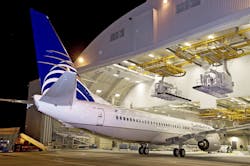FAA to Fine Boeing $3.9M Over 737-NG Defects
The Federal Aviation Administration (FAA) reported it is proposing fines exceeding $3.9 million for Boeing Co. in a case involving defective "slat tracks" installed on the Boeing 737-NG, a problem that emerged in June of this year when the jet builder issued a service bulletin to 737 Next-Generation operators, concerning cracks in a component that attaches the jet's fuselage to the wing structure.
Following Boeing's notice in June — up to now described as involving cracked "pickle forks" that attach a plane’s fuselage to the wing structure — the FAA issued an Airworthiness Directive, mandating inspections of affected 737-NG aircraft.
The 737 Next-Generation is the third version model of the 737 series, the one that preceded the current 737 MAX model. The issue that prompted the FAA’s inspection order is separate from the flight-control issue that has idled the entire 737 MAX fleet since March.
FAA alleges that Boeing failed to adequately oversee its suppliers to ensure they complied with Boeing's quality assurance system, and that this failure resulted in installation of slat tracks that were weakened by "hydrogen embrittlement" that occurred during cadmium-titanium plating.
The agency cites Southwest United Industries as the Boeing supplier that processed the slat tracks and shipped them to Spirit AeroSystems, which delivered the parts to Boeing.
According to FAA, identification of the defective slat tracks was hindered because SUI did not apply a protective coating over the part identification mark, as required to be displayed on the parts. As a result, those part IDs became obscured or invisible, making it difficult to identify the defective parts.
FAA also alleges that SUI notified Kencoa Aerospace LLC, on July 6, 2018, that a batch of the slat tracks had failed a quality test, indicating the presence of hydrogen embrittlement. Kencoa passed that information to Spirit in early August 2018.
The FAA cited Boeing for failing to maintain its quality assurance system, to ensure its suppliers adhered to Federal Aviation Regulations.
In addition, FAA alleges that from mid-August through early October 2018, Boeing certified as airworthy approximately 48 aircraft potentially equipped with defective slat tracks. And, that from October 2018 to May 2019, Boeing knowingly certified as airworthy 85 more potentially affected aircraft.
Boeing has previously said more than 1,000 planes met the conditions for the inspections and that fewer than 5% qualified for repairs.
Both Southwest Airlines and Quantas Airways are known to have idled three aircraft that exhibited the defective parts.
FAA regulations allow Boeing 30 days to respond to the letter proposing this civil penalty in the total amount of $3,916,871. Reportedly, Boeing is reviewing the FAA's allegations.
